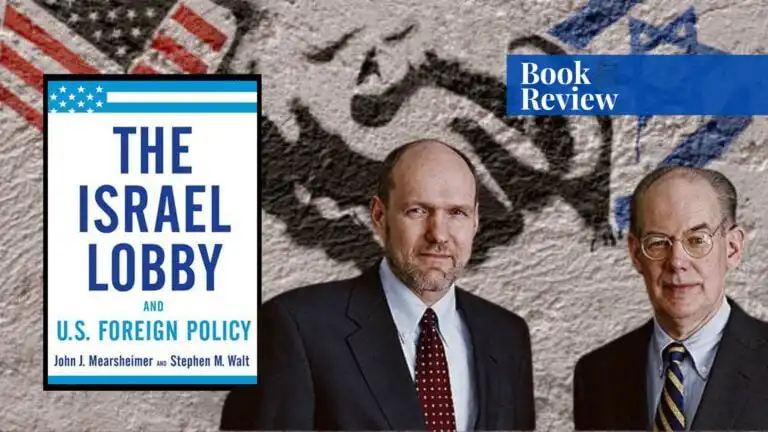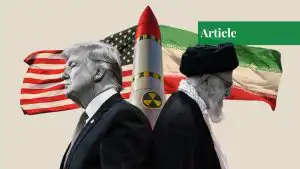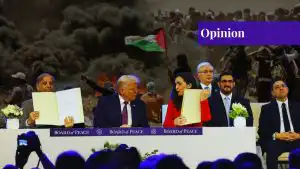Introduction
During the 21st century, John J. Mearsheimer and Stephen M. Walt wrote The Israel Lobby and US Foreign Policy through which they offered extensive evidence-based arguments about the pro-Israeli pressure groups. The book demonstrates that Middle Eastern policymaking decisions pivot towards Israeli demands at the expense of US regional goals through the partnership between political officials and interest groups with media participants. Research validates that an automatic Israeli defense policy leads to regional security risks and reduces US national security while disrupting diplomatic goals and hurting Israel’s long-term stability.
Through its examination of conventional beliefs, the book leads readers to understand the relationship dynamics between America and Israel. As one of the fundamental works studying international relations, The Israel Lobby and US Foreign Policy alerts readers about the dangers domestic political groups pose to international affairs.
Overview and Chapter-wise Analysis
Throughout the book, the authors follow a systematic structure that unfolds their arguments in a logical order. The authors present their analysis by using a chapter-by-chapter structure that shows how intensive Israel lobby actions influence the United States.
Chapter 1: Defining the Israel Lobby
The authors dedicate their first chapter to describing exactly how they define an “Israel lobby.” Their definition describes the Israel lobby as distributed throughout many organizations and groups together with other entities trying to preserve US support for Israel. According to this position, lobbying benefits democracy, yet the Israeli lobby takes this too far through its management of policies that run against national interests.
Chapter 2: The Unwavering US-Israel Alliance
The United States built its alliance with Israel since Israel achieved independence in 1948 up to the contemporary period. America directs annual grants totaling the most extended foreign aid to Israel for programs mixing economic support with military assistance. The writers do not support the notion that Israel acts as a strategic asset because the US support has resulted in American involvement in regional conflicts instead of strengthening national security.
Chapter 3: How the Lobby Operates
The authors examine the key elements that permit the lobby to exercise its power in this segment. Mearsheimer and Walt analyze through their research the activities of AIPAC and Washington Institute for Near East Policy and pro-Israel media figures. The section demonstrates how financial support through political connections alongside media power controls how Americans develop their policy-related attitudes. The authors show that any professional retaliation targets critics of U.S. Israel policy, making vital discussions impossible.
Chapter 4: The Iraq War and the Lobby’s Role
The book generates significant controversy regarding the role Israel lobby groups played in persuading America to launch the 2003 Iraq invasion. In the book’s claim, the authors argue that pro-Israel groups with their neoconservative backing pushed ardently for the removal of Saddam Hussein to enhance Israeli security while politics and ideology merged to form the war situation. An examination of top Bush administration officials and their policy motivators will serve to validate the presented argument.
Chapter 5: Targeting Iran and Syria
The analysis extends outside Iraq to explore the lobby’s impact on US policies regarding Iran and Syria as the main regional adversaries of Israel. The lobby demonstrates its agenda by persistently advocating harsh economic sanctions together with total diplomatic removal and possible military action toward these countries even though US strategic interests may differ from their strategy. These policies create a high probability that America may needlessly enter new international conflicts, according to the authors.
Chapter 6: The Israeli-Palestinian Conflict Remains a Problematic Policy
The authors scrutinize the United States’ support for the Israeli-Palestinian conflict by indicating how American diplomacy mainly backs Israel through policies that create unjust outcomes. Washington’s inability to take action against Israeli policies faces significant criticism because experts blame the Israel lobby for blocking fair negotiations.
Chapter 7: The Anti-Semitism Debate
The authors address a crucial point about how objections to Israeli actions or Israeli lobby practices tend to result in accusations of anti-Semitism. The authors underline the requirement to differentiate between actual prejudice and valid criticism. Pro-Israel advocates have allegedly merged legitimate anti-Semitic arguments with all criticism about Israel which has created an environment where politicians journalists and academics shy away from US policy examination.
Chapter 8: The Cost of Unconditional Support
The chapter explains the complete set of fallout from America providing absolute backing to Israel. According to the authors, this unconditioned American backing of Israel has wounded US relationships with Arab and Muslim-majority nations and created greater anti-American hostility and terrorism threats. The unconditional support towards Israel has involved US entry into unnecessary wars, which has reduced American-Israeli security levels.
Chapter 9: A New Foreign Policy Approach for the US
The authors present their idea for a practical and balanced US-Israel interaction at the conclusion of their work. The authors maintain that America should support Israel only when its policies promote national interests yet expect it to face consequences when these policies disrupt regional peace. Open discussion alongside military aid evaluation and foreign policy adjustments should be pursued through strategic interests instead of being controlled by external lobbying groups, according to their proposal.
Conclusion
The Israel Lobby and US Foreign Policy presents a well-researched assessment against the dominance of lobbying groups in America’s international policy formation. In their challenge of established beliefs, Mearsheimer and Walt establish that American backing of Israel created some situations where it harmed both countries’ lasting safety. Even though it encountered harsh criticism during its publication, the book accomplished its mission to initiate vital dialogue about political decision-making, international relations, and lobbying influence. The book advocates for strategic realignment between Israel and the United States without demanding total support termination. Reading The Israel Lobby and US Foreign Policy is obligatory for anyone interested in grasping US-Middle East diplomatic relations together with the effects political influence generates on worldwide affairs.
If you want to submit your articles and/or research papers, please visit the Submissions page.
To stay updated with the latest jobs, CSS news, internships, scholarships, and current affairs articles, join our Community Forum!
The views and opinions expressed in this article/paper are the author’s own and do not necessarily reflect the editorial position of Paradigm Shift.
Sahibzada Sultan Mohammad Bahoo is a CSS and PMS mentor and descendant of the great sufi saint Hadhrat Sultan Bahoo. He has a keen interest in politics and philosophy.






